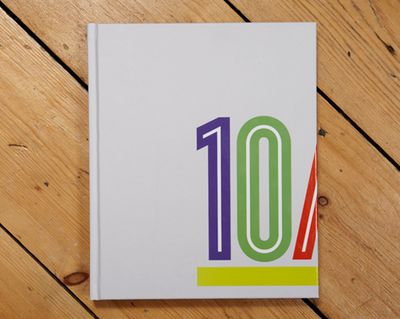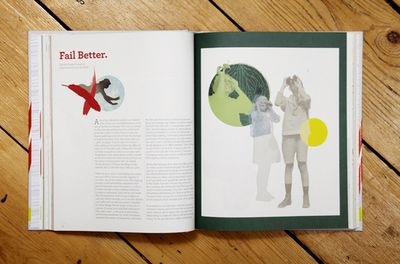
The YCN Student Awards Annual 2010/11 is out now. The Awards present live creative challenges – from the likes of Ted Baker, SEGA and Warp Records – for all those who wish to tackle them. The Annual presents a showcase of all of those Commended as part of the previous year's programme. To pepper this year's celebrated entries a host of figures from across the creative industries have been invited to impart some advice to those following in their footsteps. Each helpful sentiment has been visualised by an emerging illustrator. Editorial contributors include industry luminaries…. and W+K's own Iain Tait and William Fowler.
Mr Fowler's words of advice to young people on the theme of 'Fail Better' are reproduced below.

Fail Better
About the only role in which I can tolerate Clive Owen is as the failed assassin at the end of the Bourne Identity. He’s only on screen for five minutes, and his best line is delivered as he lies cradled in Matt Damon’s arms, his fingers paddling in the blood from the shotgun wound in his chest: ‘look…what they make you … give,’ he gasps. Then he dies. It’s a scene I often replay in my mind as I leave the office at 10pm on a Thursday night, feeling like I’ve had my brain scooped out with an ice-cream baller. Sometimes I even repeat those words to myself as the door clicks shut behind me, and I picture the sliver of evening that’s left, the rushed dinner, the hour of listless dawdling on the internet, bed. ‘Look what they make you give.’
When we go to work in advertising the companies we work for buy, not just the majority of our time, but of our creative lives. The ongoing process of self-examination, inspiration and growth that leads artists from pencil, to oils to bronzes will take us from washing machines, to jeans to carbonated, high-calorie soft drinks. And it’s sometimes hard, in long conference calls and client meetings, not to wonder whether one’s gifts, such as they are, weren’t intended for better things. Muriel Spark, writing about a group of young poets and their subsequent lives, says ‘some … took a job in advertising … and became paradoxes’, by which I’ve always assumed she meant, successes who had failed.
But the idea that talent is meant for just one thing is a strange one. Meant by whom exactly? And are they allowed to change their minds? Why should making poetry or, say, sculpture, which is accessible to so few, be inherently better than making advertising which has the potential to bring happiness not just to those that see it, but to all those people whose livelihoods depend on its effectiveness? That’s before we get to the conviviality of agency life. The sense of purpose versus the sense of self-indulgence. Participation versus separation.
Yet the fact remains that when we take a job we do make a sort of diabolical pact. We offer the agency our skills and in return we are granted the wherewithal and distribution mechanisms that mean our ideas can be produced quickly and beautifully and spread all over the world in the blink of an eye. We pay the price with the branding, the starbursts and the logos, the single-minded message, ‘buy this’, which makes advertising advertising. If it fails as art then it’s because it has a purpose, to sell product, where as the purpose of art remains part of its mystery.
So it seems to me that once we’re in an agency we have a choice, and it is one that some people never seem to get to grips with: we can either keep trying to make art which will fail as advertising. Or we can decide to make advertising that fails as art. I chose the second option, and I make it my business to fail better with every ad I make.
There are two things that advertising has to do and failure is intrinsically linked to both of them. The first is to make brands knowable, and the second is to make them memorable.
So firstly – knowability. The playwright, Alan Bennett, has said that the features that define a writer’s individual style are the things that they’ve introduced to hide what they can’t do. A perfect style would be invisible, we would see nothing of the writer, only what they wanted to say. And when you think about it, what could be more bland, more thoroughly unknowable than perfection? When we talk about personality perhaps we’re really describing the ways in which a particular person or thing is not perfect, or the ways they compensate for their flaws; there is a reason very few male models also do stand-up comedy, and it has nothing to do with needing their beauty sleep. But to bring the demonstration back to advertising, consider a brand that has to sell a shower gel for men. The discourse of masculinity is tired and clichéd, however this is precisely the field in which the brand has to participate. So the problem is, how to work around this difficulty, how to engage in the discourse whilst remaining likeable. The best answer turns out to be through self-parody, humour that mocks the idea of manliness. Yes, it is absurd that a man should be expected to smell like a man … so let’s make it absurd. We identify with the dilemma, we recognise the workaround, and through it we know a humane personality.
Failure is also intrinsically linked to memorability. Let’s try a quiz: what was the name of the boy who flew too close to the sun? What about his father, whose flight was successful? Name the two sister ships of the Titanic (both of which were larger than her). Name one perfectly upright tower in northern Italy. You get the point. If stories ever had a purpose apart from to entertain, it was to instruct. To give the listener the opportunity to learn from the failures of others. Our jobs have a great deal to do with story-telling, so we should at least remember that failure is an option. Consider a recent meerkat-based TV campaign, website and now bestselling pseudo-celebrity biography built on a baroque exploration of a typo.
The gruelling process of getting a job in the creative industries is the ideal preparation for all this. The crits, the placements, the long hours and low pay of our early careers. Advising anyone to try to get a job in advertising is like telling them to become a cage fighter – even if they turn out to be good at it, they’re bound to have the shit kicked out of them a few times along the way. I have reason to be incredibly grateful to Paul Arden for writing that ‘if you’ve never been sacked, it’s probably because you’re not very good.’ In six years I’ve been sacked twice and made redundant once. It’s not like I haven’t been offered the opportunity to leave the industry and yet I have kept coming back. There’s no shortage of grads either, thousands of bright young things who cast themselves onto the rocks with their eyes open. Advertising may be a strange vocation, but it is a vocation nonetheless, something you want to do for reasons that you may never quite understand.
A few days ago I went to see a friend. She is at that stage in life where you live in a shared flat, in a drizzly portion of north London and work double shifts in a pub whilst you try to work out, once and for all, what to do. I sat drinking tea in her too-low Ikea armchair, nodding, but feeling like Ben Stiller in Reality Bites, a film which, being 24, she had never heard of. I have a job at an agency I like, doing work for clients that I like. I have a bit of money and column in a magazine. Verily, it seems, I have arrived on advertising’s sunny uplands. And yet, in a sense, I have failed; failed catastrophically to achieve the things that I wanted for myself when I was 24. How does that make me feel? Well, you know, all right actually.
What I seem to have discovered is that you can fail and still be happy. In fact, you have to. And the good news is that once you realise this, there is nothing left to fear.
‘Have you considered advertising?’ I asked her. ‘It’s not as bad you might think.’
William Fowler
For more words of wisdom and to see the commended work, buy the annual.




